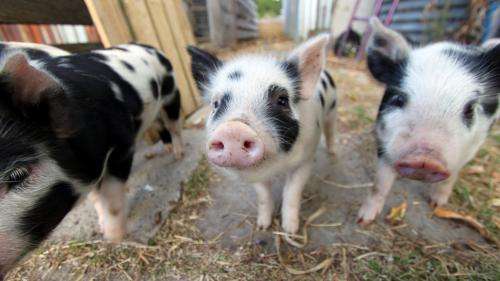Antibiotic resistant Golden Staph has been detected in Australian pigs

The first evidence of the livestock-associated antibiotic resistant Golden Staph has been detected in Australian pigs, a national group of researchers warns.
Well-established in many European countries, Canada and Singapore, livestock-associated methicillin-resistant Staphylococcus aureus (LA-MRSA) had not been reported in food-producing animals in Australia until nasal swabs from 324 pigs from herds around the country were collected by the group.
Researchers say their findings suggest the isolates have a common ancestry with European isolates, indicating that the strain did not evolve independently in Australia, but arrived as the result of an 'exotic incursion'.
Dr Geoffrey Coombs from Curtin University's Australian Collaborating Centre for Enterococcus and Staphylococcus Species Typing and Research worked on the project with Associate Professor Darren Trott from the University of Adelaide's School of Animal and Veterinary Sciences.
Dr Coombs says this incursion was likely not due to imported pigs or poultry, thanks to the ban on live importation of these animals and the strength of quarantine measures.
"Human carriers are a likely mechanism, since there are currently more than 12 million international visitors and returning residents entering Australia each year," he says.
"The duration of colonisation of the human nasal passage with MRSA can exceed 14 days, thus providing ample opportunity for transmission into livestock even if only a small proportion of travellers make sufficient contact."
The researchers say that more extensive sampling of animals in Australia for MRSA ST398 is required to define the prevalence of colonisation, host range and geographical extent of spread.
"The movement of horses into Australia is also a notable risk given that equines are competent MRSA hosts and that approximately 2500 horses are imported into Australia each year without being assessed for carriage of MRSA," Dr Trott says.
Researchers believe that isolation and molecular typing could help illuminate strain sharing between humans and livestock, providing vital information into MRSA ST398's significance as a human pathogen.
MRSA could spark epidemic
This information could prove vital, as a 2008 editorial in the European Society of Clinical Microbiology and Infectious Diseases warned of the bacteria's ability to spread between humans and its ability to pick up additional virulence factors.
The authors suggested that this made it "probably just a matter of time" before an epidemic outbreak involving MRSA ST398 occurred.
The editorial noted that community-acquired and hospital-acquired MRSA ST398 infections in humans involving endocarditis, ventilator-associated pneumonia and wound infections in the Netherlands, Germany and Denmark.
Provided by Science Network WA















